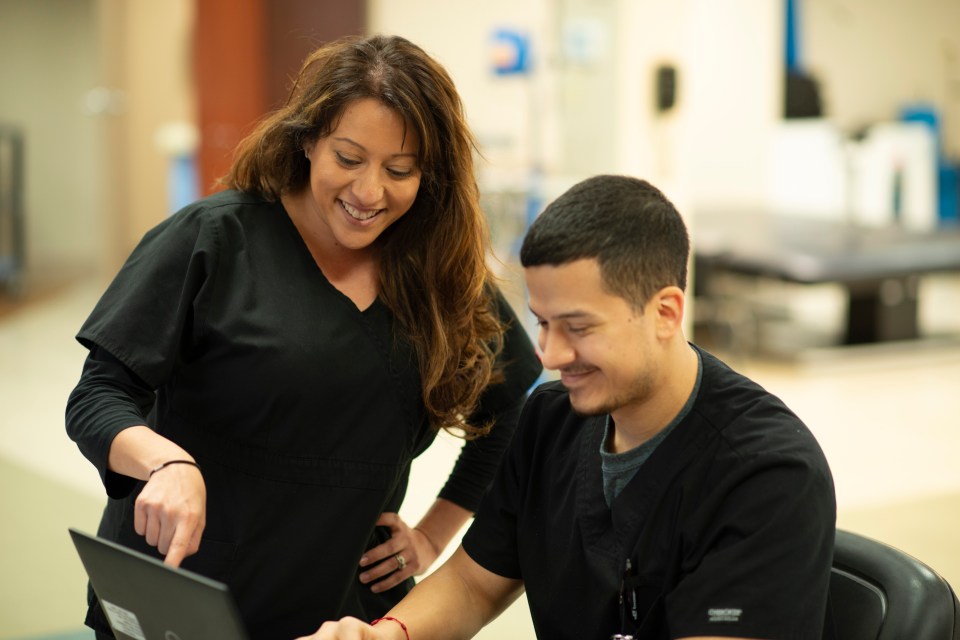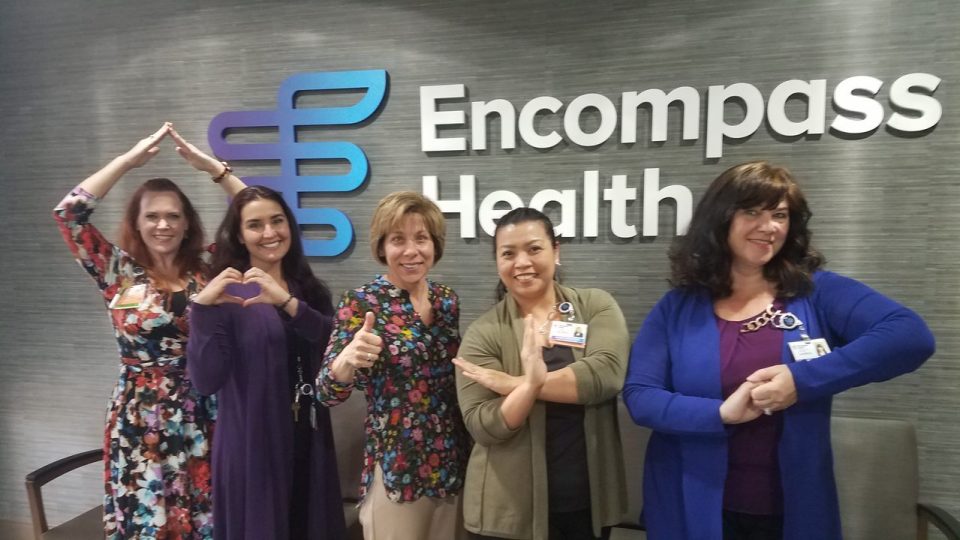Mentoring student clinicians offers help with materials, the possibility of new hires, relief from burnout, and other benefits. Here’s how to get started.
Speech-language pathologists in healthcare face many workplace pressures: productivity requirements that average 79% of time in direct patient care, helping patients achieve functional gains, and maintaining patient satisfaction. So why take on more responsibility by supervising student clinicians?
I have supervised more than two dozen graduate student interns in my relatively short career, and supervision has become one of my favorite roles. The rewards are greater than you might think.
Benefits of student supervision
Interestingly, supervision contributes to your own professional development and the development of our field. Students often bring cutting-edge knowledge from their recent coursework. They also have free access to full-text journals, which they may share with you. Interns may be required to give a final presentation on a specific topic, which can benefit the entire clinical staff. And, as an incentive to take on their interns, some universities offer supervisors free online continuing education courses and conferences related to supervision and supervisory skills.
Ultimately, the mentorship process allows us to give back and improve the future careers of new clinicians. Newly employed graduates whose mentors were caring, encouraging, and ignited a love of learning were twice as likely to be engaged at work and three times as likely to be thriving in their careers, according to a 2014 Gallop-Purdue Index Report. In developing your own leadership and mentorship skills as a student supervisor, you contribute to the larger commitment to support new graduates, and you perpetuate positive mentorship roles in the continuous student-professional mentorship cycle to sustain our profession.
Students can help develop functional therapy materials that help patients generalize their skills in community settings and increase independence. Students can devote time to conceiving, developing, and improving these resources for your department. Some of my favorite student-created materials include a medication-management training kit, a financial management treatment binder, and a portable sequencing card set for mobility and activities of daily living tasks.
As a hiring supervisor, I have hired several of my prior students, as they require less training and orientation than experienced SLPs outside the company. Students become well-versed in our electronic medical record (EMR) system, procedures, materials, and culture. Clinical fellows (CFs), of course, need support with more advanced clinical skills and complex patients, but a CF who has interned at your facility is more likely to demonstrate more autonomy and productivity than external new hires because they are familiar with the policies, procedures, and staff.
I look forward to my next student when burnout and monotony start to creep up at work. Teaching students hands-on skills reignites my passion and enthusiasm for patient care. It’s hard to describe the pride you feel when an eager and hardworking student completes an internship. I always consider it a “win” when especially passionate and talented students develop a love for medical speech-language pathology.
Successful implementation
Have I convinced you to give it a try? Successful student supervision requires organization and planning.
Prepare to teach
- Know your state and facility’s requirements for student interns.
- Inform clinical coordinators at nearby universities about your patient population, average caseload, hours, and required length of internship at your facility.
- Require prospective students to submit a resume and cover letter. Interview them to determine if the setting, the students’ professional goals, and your personalities match.
- Complete professional development coursework in supervision.
Clearly communicate expectations
- Begin each internship semester orienting a new student as if orienting a new staff member; include documentation guides/checklists, definitions of common terms you use, evaluations, and therapy materials.
- Many students don’t know how to communicate their needs and expectations. I use the Supervisory Expectations Rating Scale by Lillian Larson to guide the type and quantity of supervision each unique student-mentor relationship requires.
- Make sure students know they must complete all documentation.
- Develop a curriculum and a weekly timeline for progression. Include the range of clinical hours, tasks to be completed independently, and percentage of direct supervision provided. Review at least twice weekly to gauge progress and fill in knowledge gaps.
- Provide feedback in multiple formats—verbal, written, and through demonstration/modeling. Use written feedback forms for evaluations and treatments at least weekly.
- Teach mindfulness. Students must observe and practice the skills that optimize compassionate, holistic care. They need to consider and address immediate patient/caregiver needs and identify the resources, referrals, and community supports needed for rehabilitative success. Mindfulness techniques help students stay focused on the present during patient care—to avoid errors and ensure all aspects of care are addressed—demonstrate resilience on even the most challenging days, and ideally reduce burnout in a demanding career.
Recognize differences
- Give students time, explicit teaching, and modeling to bridge the gap between theory and clinical application of skills.
- Be aware that your strengths and preferences for teaching may differ from your student’s learning style; be prepared to encourage students to communicate what they need to see/hear/do to master skills.
Tackle productivity
Point-of-service documentation, use of EMR, and higher productivity demands can be a challenge when mentoring students.
- Document sessions while the student is working directly with patients and honing clinical skills in the early weeks of the internship.
- Have students work with patients earlier in the day so they have time to complete documentation as you work with other patients later in the day.
- Demonstrate your strategies and shortcuts for completing quality, timely notes.
- Provide handouts for common medical abbreviations and teach students to avoid redundancy to help cut down on documentation time.
Universities Tackle Externship Shortage
“I’m sorry, we don’t offer SLP externships.”
Although externships are essential to clinical education, graduate students and university externship coordinators increasingly hear this response—to the point of crisis in the ability of graduate programs to secure externship placements, especially in medical settings.
One-third of graduate program respondents to ASHA’s 2017–2018 Communication Sciences and Disorders Education Survey reported insufficient clinical placements as having a moderate to major impact on enrollment. At the same time, the Bureau of Labor and Statistics projects job growth in the field at 18% through 2026. University programs’ inability to increase enrollment for lack of externship placements will contribute to SLP shortages.
Why are some health care facilities unwilling to participate in student training? Reasons include lack of awareness of this crisis; complicated and inconsistent communication systems between university programs and potential training sites; changing and misunderstood Medicare and Medicaid reimbursement rules; high productivity requirements and the perception that sites receive no return on their student training investment; minimal incentives for clinicians and employers to train students; complex and sometimes lengthy onboarding processes; and medical settings unwilling to create new affiliation agreements with universities.
Concerned university externship coordinators are working toward solutions through a group formed in the online community of Special Interest Group 11, Administration and Supervision. We are investigating possibilities: expanding awareness of barriers, increasing the ease of communication between university programs and partner sites, developing systems for easy access to CEUs and other incentives, and conducting research to enhance the evidence base for ways to obtain and implement placements and to support students and mentors throughout the externship placement process.
For more information on helping support graduate student training or to get involved with the Externship Coordinator Action Committee to work toward positive change, visit bit.ly/xtern-action-cmte.
Author Notes
Sarrah Yoder, MS, CCC-SLP, is a therapy team leader for Encompass Health Rehabilitation Hospital of Colorado Springs. She is an affiliate of ASHA Special Interest Group 13, Swallowing and Swallowing Disorders (Dysphagia). sarrah.yoder@encompasshealth.com
Nicole Reisfeld, SLPD, CCC-SLP, clinical supervisor/internship coordinator, University of Northern Colorado Greeley, and other members of the Externship Coordinator Action Committee
This article was originally published in The ASHA Leader.
The content of this site is for informational purposes only and should not be taken as professional medical advice. Always seek the advice of your physician or other qualified healthcare provider with any questions you may have regarding any medical conditions or treatments.



